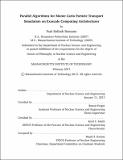| dc.contributor.advisor | Benoit Forget. | en_US |
| dc.contributor.author | Romano, Paul K. (Paul Kollath) | en_US |
| dc.contributor.other | Massachusetts Institute of Technology. Department of Nuclear Science and Engineering. | en_US |
| dc.date.accessioned | 2013-09-12T18:03:17Z | |
| dc.date.available | 2013-09-12T18:03:17Z | |
| dc.date.copyright | 2013 | en_US |
| dc.date.issued | 2013 | en_US |
| dc.identifier.uri | http://hdl.handle.net/1721.1/80415 | |
| dc.description | Thesis (Ph. D.)--Massachusetts Institute of Technology, Dept. of Nuclear Science and Engineering, 2013. | en_US |
| dc.description | This electronic version was submitted by the student author. The certified thesis is available in the Institute Archives and Special Collections. | en_US |
| dc.description | Cataloged from student-submitted PDF version of thesis. | en_US |
| dc.description | Includes bibliographical references (p. 191-199). | en_US |
| dc.description.abstract | Monte Carlo particle transport methods are being considered as a viable option for high-fidelity simulation of nuclear reactors. While Monte Carlo methods offer several potential advantages over deterministic methods, there are a number of algorithmic shortcomings that would prevent their immediate adoption for full-core analyses. In this thesis, algorithms are proposed both to ameliorate the degradation in parallal efficiency typically observed for large numbers of processors and to offer a means of decomposing large tally data that will be needed for reactor analysis. A nearest-neighbor fission bank algorithm was proposed and subsequently implemented in the OpenMC Monte Carlo code. A theoretical analysis of the communication pattern shows that the expected cost is O([square root]N) whereas traditional fission bank algorithms are O(N) at best. The algorithm was tested on two supercomputers, the Intrepid Blue Gene/P and the Titan Cray XK7, and demonstrated nearly linear parallel scaling up to 163,840 processor cores on a full-core benchmark problem. An algorithm for reducing network communication arising from tally reduction was analyzed and implemented in OpenMC. The proposed algorithm groups only particle histories on a single processor into batches for tally purposes - in doing so it prevents all network communication for tallies until the very end of the simulation. The algorithm was tested, again on a full-core benchmark, and shown to reduce network communication substantially. A model was developed to predict the impact of load imbalances on the performance of domain decomposed simulations. The analysis demonstrated that load imbalances in domain decomposed simulations arise from two distinct phenomena: non-uniform particle densities and non-uniform spatial leakage. The dominant performance penalty for domain decomposition was shown to come from these physical effects rather than insufficient network bandwidth or high latency. The model predictions were verified with measured data from simulations in OpenMC on a full-core benchmark problem. Finally, a novel algorithm for decomposing large tally data was proposed, analyzed, and implemented/tested in OpenMC. The algorithm relies on disjoint sets of compute processes and tally servers. The analysis showed that for a range of parameters relevant to LWR analysis, the tally server algorithm should perform with minimal overhead. Tests were performed on Intrepid and Titan and demonstrated that the algorithm did indeed perform well over a wide range of parameters. | en_US |
| dc.description.statementofresponsibility | by Paul Kollath Romano. | en_US |
| dc.format.extent | 199 p. | en_US |
| dc.language.iso | eng | en_US |
| dc.publisher | Massachusetts Institute of Technology | en_US |
| dc.rights | M.I.T. theses are protected by
copyright. They may be viewed from this source for any purpose, but
reproduction or distribution in any format is prohibited without written
permission. See provided URL for inquiries about permission. | en_US |
| dc.rights.uri | http://dspace.mit.edu/handle/1721.1/7582 | en_US |
| dc.subject | Nuclear Science and Engineering. | en_US |
| dc.title | Parallel algorithms for Monte Carlo particle transport simulation on exascale computing architectures | en_US |
| dc.type | Thesis | en_US |
| dc.description.degree | Ph.D. | en_US |
| dc.contributor.department | Massachusetts Institute of Technology. Department of Nuclear Science and Engineering | |
| dc.identifier.oclc | 857587661 | en_US |
